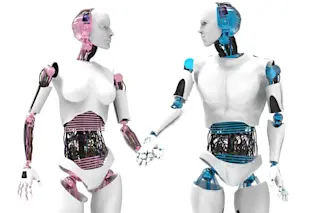Credit: Giovanni Cancemi | ShutterStock Science fiction has long toyed with the idea of robot companions that provide romance or sex for humans. Modern robotic technology capable has not yet caught up with such fantasies, but the mere possibility has already inspired a new campaign to ban the creation of such robots. Advocates of the ban argue that sex robots would "contribute to gender inequalities in society" by reinforcing attitudes that objectify women in particular. The Campaign Against Sex Robots directly compares the idea of sex robots with human prostitution by suggesting that the sellers of sex are "reduced to a thing" in the minds of the buyers. A position paper for the campaign by Kathleen Richardson, senior research fellow in the ethics of robotics at De Montfort University in Leicester, UK, argues that sex robots would not have a positive impact on society by replacing human prostitution, as some ...
A Call to Ban Sex Robots
Explore how sex robots and gender inequality intersect, with campaigns advocating against technology that may worsen societal issues.
More on Discover
Stay Curious
SubscribeTo The Magazine
Save up to 40% off the cover price when you subscribe to Discover magazine.
Subscribe













